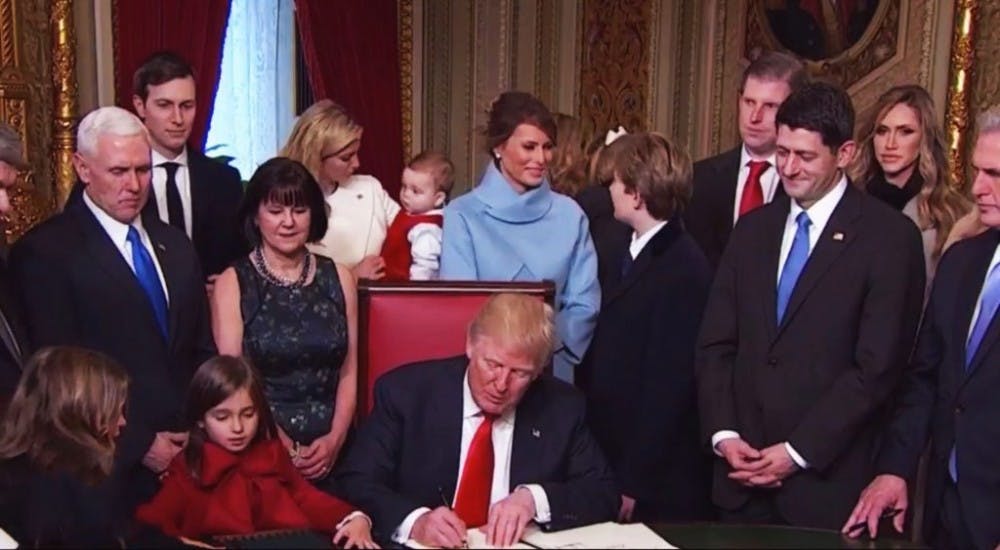Yet, besides the obvious absence of diversity, two other glaring and unsettling trends continue to hang above the administrative picks like a neon sign. More than a few of Trump’s picks have little to no experience in the field in which their position is situated, and several have histories of either promotion of regressive policies or opposition to the departments they are now expected to lead.
Rex Tillerson, former CEO of ExxonMobil, is now secretary of state. Betsy DeVos, besides having no experience in education, has pushed charter schools and their deregulation, which has led to a severe decline in educational standards in Michigan. She is now secretary of education.
Still unconfirmed Scott Pruitt, the pick for EPA administrator, has attempted to strip down governmental environmental regulations and maintains both investments and close ties to the fossil fuel industry. He has sued the EPA numerous times and has now been chosen to lead it.
Previously unconfirmed was Andrew Puzder, who withdrew on Feb. 15, and has consistently opposed basic labor regulations. His company has faced class-action lawsuits over cheating workers out of their wages. He was poised to be confirmed as secretary of labor.
Perhaps the situation would be slightly less worrisome were it not accompanied with the frighteningly explicit, shamelessly prejudicial and unapologetically nationalistic worldviews held by several of these cabinet members.
Not only are some of them are virtually unqualified or supportive of regressive policies, but in the case of a few key figures, they are dangerous and discriminatory. At times, anti-democratic views have been legitimized.
Among the most notable examples is appointed Chief Strategist Stephen Bannon, former executive chair of Breitbart News, which he himself termed “the platform for the alt-right.” As much as certain members of the alt-right would like to paint it in more palatable colors, this movement’s main rhetoric and attitudes are obsessively centered on white nationalism and frequently promote racism, anti-Semitism and Islamophobia.
Despite whatever Bannon claimed the term meant to him at the time of that comment, his own views and actions both before and after his appointment continue to reinforce the idea that his involvement with the alt-right goes beyond mere “association.”
Bannon was also the one to comment that the media should “keep its mouth shut,” an anti-press sentiment which is all too often heard from the president himself.
What of former National Security Advisor Michael Flynn, who has regularly interacted with alt-righters on Twitter, disseminated fake news and tweeted “Fear of Muslims is RATIONAL” (caps originally included)?
And what about Jeff Sessions? If he was denied federal judgeship for his racist views in 1986, he certainly does not belong in the position of attorney general in 2017. Those views are only some of the harmful ones he may continue to uphold.
By surrounding himself with these people, Trump is establishing a positive feedback loop. The harmful and dangerous views of his cabinet will propel Trump’s own inflammatory and impulsive rhetoric and actions, which in turn will further encourage the cabinet to continue enacting detrimental policies.
This cycle may emerge not only in reference to social issues but also for all points of the governmental spectrum: economic, environmental, educational, etc.
By placing these people in a position of power, Trump allows them to wield enormous influence over himself and over governance — penning executive orders, dealing with international relations and steering military operations.
Yet for the majority of cabinet and other top administrative positions, senate confirmation is required. Granted, Bannon’s and Flynn’s roles were solely presidential appointments. But what of Tillerson? DeVos? Sessions? Or others — Mike Pompeo, who previously supported torture and wants to buddy with Russia, for CIA director? Tom Price, who is adamantly for repealing the ACA and has questionable investments in health care companies, for health secretary?
The litany of problems surrounding many of Trump’s picks has been overwhelming. Yet, so far, only three Republican senators have defected from the party and each only once. The Democratic opposition has been relatively sustained, but without a few Republican defectors, each nominee will ultimately be confirmed.
Republican senators, at least some of them, must realize how ill-fitted these picks are. Yet they continue to vote along party lines, some undoubtedly for fear of being singled out by Tweeter-in-Chief. Several Democrats have also defected in certain votes, some from red states, possibly in fear of losing a re-election.
Yet now is not the time to play dicey political games. Now is the time for our senators to be outspoken, to vote “No” on the administrative picks who will do damage in the positions they’ve been nominated for.
It’s a long shot as far as most Republicans go. But pressure your representatives. Call them. Support the ones who have been outspoken. Tell your senators to act with integrity.






